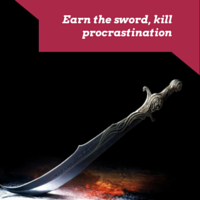Jorge did a great job as an organizer. He made every piece of the event fit gracefully.
One year later in December of 2013 Jorge was not around to take charge of the organization, so I volunteered myself.
Two weeks before the event I still had nothing. The auditorium wasn't booked. The flyers wasn't even done. The speakers weren't aware of everything. Everything was quite a mess!
I tried to organize a full event from my head, not writing down a thing. What a mess! I didn't even think to make a plan.
The event went fine, but the previous one was better.
By learning how to make lists and plans, you will increase your productivity and kill procrastination.
♦♦
"Planning is bringing the future into the present so that you can do something about it now."I was just thinking about the past, the future, and the present. I started to drew, then revelation time came to me!
I drew a man with sticks and a thinking bubble. I wrote past and future inside the bubble, and I put present outside the bubble.
That is life! Future and past are in your head but the present is what matters. I read about that before but I just noticed it.
Fortunately according to the heading of this section you may be able to take future out from the bubble.
It is all about planning. If you plan, you put the first seed to accomplish a goal.
♦♦
"The better the plan, the easy to get started."The better the plan, uh? Then there should be a metric.
I read that a good written text should be wrote, re-wrote, throw it to the trash, re-write what you re-wrote, and finally write the final version.
Use the same idea for a plan. Write and re-write. It cost anything.
I read that form James Altucher. I also found it in "On writing well" (William Zinsser).
It makes sense. The first try is not a 100% perfect. We need practice. If you keep practicing you will always reach a better plan.
Now, I am confused. I read on the "Artist's Way" (Julia Cameron) that perfectionism thwart your creativity. Should we just keep the first try then?
I don't think so.
♦♦
I got this one from Dr. Barbara Oakley.
"Do not enter the water without knowing how to swim."The translation is "Do not take action without a plan". Please make it a written plan!
If you begin by visualizing who you want to be in the future, then you can work towards it.
That is how you bring the future into the present.
Planning is a sword against procrastination and a health potion for productivity.
♦♦
Now let's talk about the lists!
It is a recommendation that you may have a
- Master list - all you want to accomplish.
- Month list - all you want for the next month.
- Weekly list - for the next week.
- Daily list - for tomorrow.
Ok. You don't have to strictly follow the instructions. I didn't. Some times I only used daily lists. Some other I had a master list and daily lists. But, I've tried them all.
One simple rule for the daily list. "Make your list the night before the workday ahead".
The first time I just followed that instruction. I didn't think why it had to be that way.
In the book (see below) it is mentioned that during the night your brain work on your list and you will wake up with new insights.
You know. It is TRUE!
Later, Dr. Barbara Oakley taught why. Diffuse mode!
Diffuse mode works when you are sleeping. It is a way to access many parts of your brain without getting stuck at a specific situation.
Now, Dr. Oakley taught one more important thing that was not mentioned on the book.
Make a list to free your night thinking of next day duties. Now, while you sleep you can focus on other problems and solve them.
------- Important fact. "When something new comes up, add to the list before doing it".
It is important to know where your time went. If not at night you won't know what you did with your time.
♦♦
Now. Let's put in the table a rule. But more than a rule, it is a revelation.
10/90 Rule
"The first 10 percent of time that you spend planning and organizing your work before you begin will save you as much as 90% of the time."
Let's do some math.
Unplanned activity time = 100 minutes.
10 percent of unplanned activity time designated to plan = 10 minutes.
90 percent of unplanned activity time saved = 90 minutes.
Work time when you have a plan = 10 minutes.
Then,
Total time with a plan = 20 minutes.
Total time without a plan = 100 minutes.
See? Awesome right?
♦♦
This post originally appeared at: Grad life au Canada
In this post I put down some own comments about the second chapter of the book mentioned below.
Author: Brian Tracy
Type of book: Self development, time-management


Nenhum comentário:
Postar um comentário